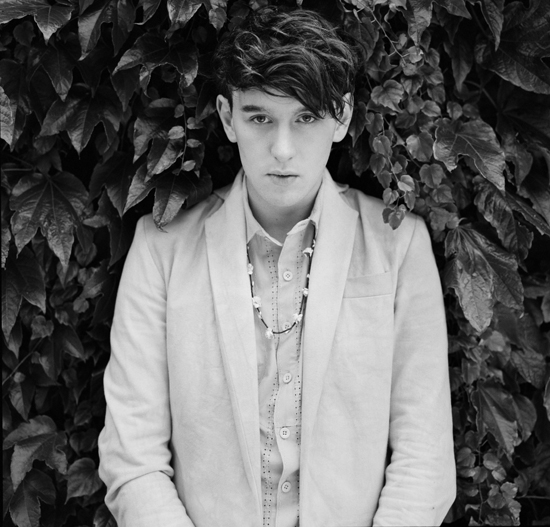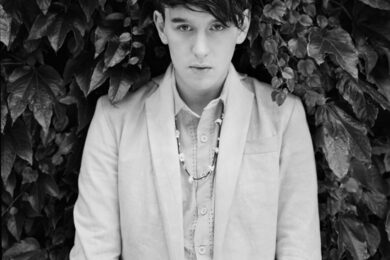There’s no doubt the Patrick Wolf is one of our most perplexing, most contradictory, most English of singers on the fringes – and increasingly moving into the heart of – the pop world. I first knew of him as the young man who wrote the tortured and energetic laptop punk that made up Lycanthrophy, and have followed through the pastoral Wind In The Wires, the attempt, perhaps made too soon, at youthful pop that was The Magic Position, the angry Alec Empire-produced The Bachelor and now this, Lupercalia his most coherent assault on mainstream attention yet. Tracks like ‘Time Of My Life’, ‘Falcons’ and ‘House’ are superb, big-chorus pop, while ‘The Days’ is mainstream classicism without becoming pastiche, or too overwrought. ‘Together’, meanwhile, reminds me of Pet Shop Boys in 40s suits.
There’s certainly a celebratory air to the album, something hinted at by its title, the name for the ancient fertility festival connected to the legend of Romulus and Remus, as Patrick Wolf says, "its about two boys running naked through the city, and that reminded me of me and William in a way – not running naked through the city, but bringing the best elements of our relationship to share with the world, and inspire optimism. It’s a celebration of love in the context of the city, and that’s what this record is."
With support from Radio 2 and slightly bizarre videos that look like an advert for preppy beachwear, it seems to be working for Patrick Wolf. We meet in the basement of a Waterloo cafe, not far from his new home (every time I interview Patrick Wolf he seems to be moving house) to discuss the new record, and why, given in this last interview I did with him he was exulting in leaving Universal, he’s now back on a major label. Firstly, though, for someone who emerged on the fringes of a more experimental music scene, why has Patrick Wolf stuck with the pop for so long?
Patrick Wolf: I’ve planned out my life quite pragmatically. While I still feel confident on stage and perform as a young man I want to dedicate this part of my life to more pop lyrics and so on. Then it’s full circle, in my late 30s and 40s I can grow a beard and get fat and play with odd synths. I’ve learned unfortunately that you can’t write circular scores and make experimental music and expect anything other than to be on the dole for ten years. I understand that if I can compartmentalise my life it makes more sense to be wiser, fatter, merrier and more reclusive in my later years.
So you’ve always been a strategist?
PW: I had a lot of time when I was 11 and 12 to make my own future.
There’s a lot of London on the new album, can you tell us about your relationship with the city at the moment?
PW: I was born in St Thomas’ and now I live two minutes from there. For a while I wanted the album to be set in one area so I could get a grasp on the square mile around my house rather than being fragmented by being in a different city every day. There are 27 years that I have been rooted to London, travelling aside, but I would say I’m very much at the end of my relationship with London, and I’m looking to move in the next couple of years, to a totally different country. The album is rooted to London because I am documenting the end of my relationship with the city, and then I want to move on, to set sail, which is why ‘Falcons’, that last track, has that air of a migration to it. I’m ready to leave England.
Is that to challenge yourself as much as a sense of dissatisfaction?
PW: It’s not in my nature to settle down at all. I have settled down in the last few years, but it’s very much in my behaviour pattern to make sure that as soon as I get comfortable, to quickly ensure that I get uncomfortable as soon as possible.
Do you know where you might go?
PW: I just went to Florida. I want to go to somewhere that’s the opposite of my life; I want to go somewhere where there are crocodiles and pelicans….
…and retired Americans on sun loungers?
PW: Maybe I’ll make a bluegrass album or something. I think I’m ready for a country album. I’d be like the male KD Lang.
So on The Bachelor you were militantly doing things by yourself, and now…
PW: It was a survival thing. That’s what I needed to do to finish my album. The Bachelor would only just be coming out now if I’d gone through the traditional system. I want to have an album out every two years.
Was it a difficult decision going to a major again? I was surprised, I thought ‘he’s being a contrary bugger again’.
PW: I was surprised! I didn’t expect it, but I did this show at Reading Festival, and this guy Keith Wozencroft was there, and he’d never heard my music, but he because really interested in my work and started flying out to my shows, and I ended up with someone who I feel is going to support me for many many years, and has given me more creative freedom than I’ve had on any other label before, who gives me my own space to work and isn’t obsessed with the commercial value. I’ve found somebody who I wish I had met on my first album.
Were you nervous?
PW: There have been big changes in my personal life and my working life. All the emotional residue from my past, I didn’t want to take any of that into my future, and I needed to cut the cord with my past experience within the music industry and within my personal life in order to start again. Therapy has been a really big thing for me, and falling in love and a new record deal. I didn’t want anything from my past to tarnish my new experience. It’s so easy to let your past fuck up your present.
So it’s an optimistic album?
PW: I think there’s sadness there, but it’s not wallowing, there’s no self-pity. I was in a lot of pain, I didn’t want to be feeling that way, that’s why I wrote those songs, to get that out of my system. I didn’t want to feel as if I didn’t belong, which is why there are so many questions in a lot of those songs. But I’ve got through that now, though I am sure there will be a next hurdle and a new set of problems as I get into my 30s. But I think that this album is a watershed moment, there’s no need to be in that misery and depression. I guess it was on the last album that I realised that I hadn’t made much progression from when I was 14 years old, and that felt serious, because that’s not what I’m about. I needed to make some changes.
Were you surprised to find that out? Did it come back at you from the songs?
PW: It was only a year later that I began to feel it. I am proud of that record and I am proud of the songs, but I am not proud of the emotional well-being. I don’t know if I am happy with what I was spreading onstage, or in the words and the music. I don’t feel as if there was any emotional resolution on that record. I felt like a lot of the shows left people feeling depressed rather than inspired.
And now you’re on Radio 2’s playlist, you’re going to have middle-aged fans as well as the rabid teenagers
PW: I love that Radio 2 have got behind this record, that dads will be listening to it while they’re doing the conservatory and potting the plants or someone’s doing the ironing. I’ve always wanted to get to people in that way.
And that video I was quite surprised by how American and, er, beachy it was
PW: There are a lot of sides to myself that I’ve hidden over the years, but I love to go to the beach, I love to swim, that video is serious! I’m not joking! People thought it was an ironic statement! The other videos are going to be about celebrating male archetypes, and that’s one of the things that this record is really about. I’ve really grown into my masculinity. I used to be a girl and very proud to be a ladyboy, but now at 27 I’m in a more masculine phase in my life. I had hatred for men, because of my experience at school, and it took me until my teens and my 20s to realise that didn’t have to tie up my relationship with other human beings. I’ve had a lot of really inspiring male friends. It’s been a big change. I’m not saying I’m not going to be a lady again…





